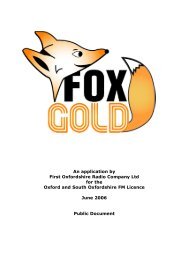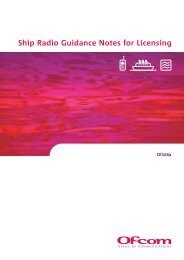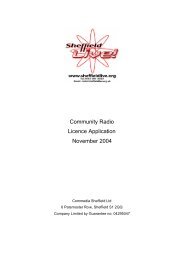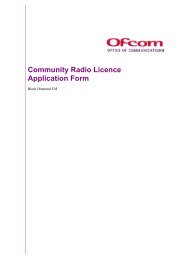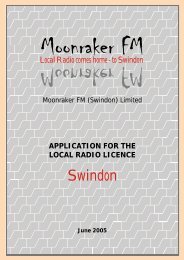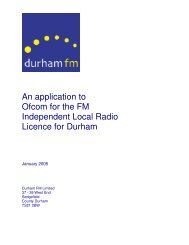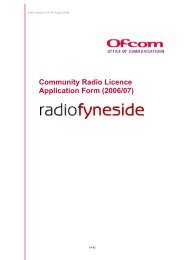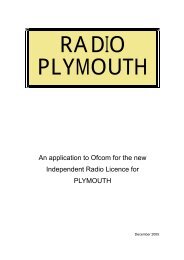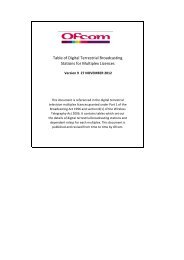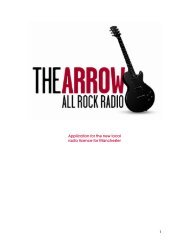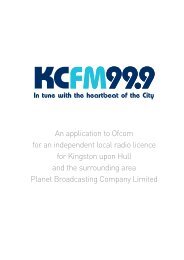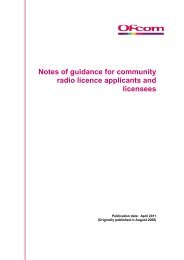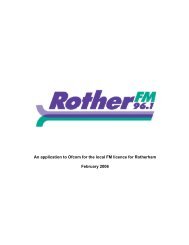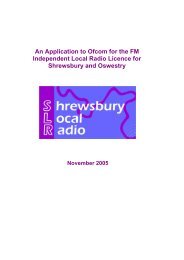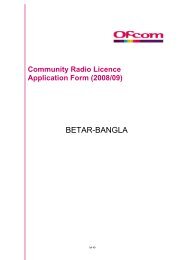Community radio licence application form TD1 ... - Ofcom Licensing
Community radio licence application form TD1 ... - Ofcom Licensing
Community radio licence application form TD1 ... - Ofcom Licensing
Create successful ePaper yourself
Turn your PDF publications into a flip-book with our unique Google optimized e-Paper software.
<strong>TD1</strong> Radio <strong>application</strong> <strong>form</strong><br />
manner, and that the outcome is fed back to the person making contact. Our team meetings consist of on-air<br />
presentation staff, producers, duty managers, station managers and directors being present.<br />
We also plan to hold open meetings to which members of the community can attend and raise any questions<br />
directly with representatives from <strong>TD1</strong> Radio. All the above will ensure that the community can really be part of a<br />
community <strong>radio</strong> station and they will be able to feel that are all contributing something as well as making a<br />
difference.<br />
We will also monitor and assess on a regular basis the strength of our community links will help to shape the<br />
station‟s future development plans and as previously mentioned, our Open Days will provide another method that<br />
will ensure members of the community can keep in contact with us.<br />
We also hold regular meetings / workshops / discussions with our own team to review and monitor our progress<br />
against the objectives and targets that we have set. This will ensure that should one objective or target not be<br />
met, we can address the issue and ensure that it gets resolved. It is anticipated that these workshops will be held<br />
on a quarterly basis to start with; perhaps reducing in frequency to half yearly if our goals are constantly being<br />
met. On the other hand if targets are not being met, we may agree to hold more frequent workshops to allow us<br />
to monitor more closely the progress of our activity and make necessary adjustments to ensure that targets are<br />
being met.<br />
Public surveys and questionnaires are another way to engage the opinions of the public. These can be published<br />
on-line, or we can produce paper-based questionnaires for use at Outside Broadcast events and Open Days and<br />
these can be posted out if required. The results of these surveys will be published on-line, and paper based<br />
copies of the results will also be available. The outcome of such surveys will also be discussed at our team /<br />
public meetings. Paper based surveys can be given to other voluntary groups, charities, organisations etc to<br />
collate for us.<br />
As mentioned previously, we also work closely with our key stakeholders to ensure that the Board of<br />
Management and our entire team are aware of any issues that arise. Our Board of Management will also report<br />
back to the local <strong>Community</strong> Council the on-going developments at <strong>TD1</strong> Radio. Other Local media and press<br />
report on the <strong>Community</strong> Council meetings, therefore through this process the public are aware of what we are<br />
doing and have the chance to respond either through the Newspaper, <strong>Community</strong> Council or directly to us.<br />
Guidance notes: station’s draft key commitments<br />
Please draft the Key Commitments for your proposed service. There is a blank key commitments document<br />
overleaf. If your organisation is awarded a <strong>licence</strong>, the key commitments you draft here will <strong>form</strong> the basis of what<br />
we put in the <strong>licence</strong>. (Please note: this would be subject to <strong>Ofcom</strong>‟s agreement, and we may require it to be<br />
amended, including, for example, to properly reflect legislative requirements).<br />
Your draft Key Commitments should be consistent with, and summarise the answers you have already given in<br />
sections 1-8 of this <strong>application</strong> <strong>form</strong>.<br />
Four sample key commitment documents are provided for in<strong>form</strong>ation at annex 1. These are provided as<br />
illustrations only – it is important that you draft your own commitments, rather than just copying what may have<br />
been done by others, or what we have put in the sample versions. You should keep in mind that it will be a<br />
condition of any <strong>licence</strong> to meet the Key Commitments: something you must do at all times and for breach of<br />
which you could face sanctions including revocation of the <strong>licence</strong>. So, you should think carefully about what you<br />
will be committing to.<br />
We would expect key commitments to be brief, and no more than two pages long.<br />
KEY COMMITMENTS: to be completed by the applicant<br />
Station name<br />
[As in section 1 of this <strong>application</strong>]<br />
<strong>Community</strong> to be served<br />
[In no more than 30 words describe the<br />
community or communities you will<br />
serve. This should be a summary of<br />
section 2.]<br />
9<br />
<strong>TD1</strong> Radio<br />
<strong>TD1</strong> Radio will serve those persons living and working in the Central<br />
Borders including Galashiels, Tweedbank, Melrose and Selkirk.<br />
We will also ensure areas of deprivation are given proper<br />
representation.



